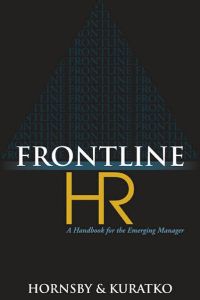Join getAbstract to access the summary!

Join getAbstract to access the summary!
Jeffrey S. Hornsby and Donald F. Kuratko
Frontline HR
A Handbook for the Emerging Manager
Thomson South-Western, 2005
What's inside?
HR activities are moving to frontline managers. Shouldn’t your organization be ready for the challenge?
Recommendation
In this age of restructuring, downsizing, cost-cutting and restless employees, frontline managers have to handle tasks normally performed by the human resources (HR) department. The problem is that many managers aren’t trained or prepared to assume these responsibilities. This situation is also unsettling for HR personnel, who see their traditional functions shifted to other departments. Jeffrey Hornsby and Donald Kuratko believe this dilemma can be resolved if HR professionals help managers master HR functions, and thus make HR relevant to a company’s overall strategic planning. The result is more qualified line managers and purpose-driven HR personnel. getAbstract recommends this dry yet informative book to any individual or organization facing a similar workplace predicament.
Summary
About the Authors
Jeffrey S. Hornsby is a professor of human resources and entrepreneurship, department of marketing and management, at Ball State University, Indiana. Donald F. Kuratko is executive director of the Johnson Center for Entrepreneurship and Innovation at the Kelley School of Business, Indiana University-Bloomington.
















Comment on this summary